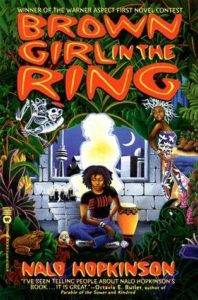

Hopes of leaving his criminal life behind and reconnecting with his love, Ti-Jeanne, are shattered when the threats from the posse leader begin to loom over him. Paths begin to cross when Tony is called upon by Rudy. In the community, she is a well-respected apothecary and spiritualist who runs an herbal and medicine shop. Gros-Jeanne has gone to great lengths in the past to share her culture with her family, but has continuously been pushed away by her daughter and granddaughter. While she loves her Mami, she has difficulty seeing the importance of her grandmother's spiritualism and medicinal work, and is frightened by her visions of death. Having recently given birth to a baby boy, Ti-Jeanne is forced to move back in with her grandmother to care for her child as a single mother the child's father, Tony, suffers from addiction and is a member of the posse. Ti-Jeanne, the granddaughter of Gros-Jeanne, is struggling with different problems than street survival. Hopkinson then introduces the heroine of the story, and a very different perspective of life in the outskirt of the city is seen. Normally, the Porcine Organ Harvest Program is used, but the adviser of Premier Catherine Uttley encourages her to deem the program "immoral" and make a public statement of preference for a human donor instead. Rudy is commissioned to find a heart for the Premier of Ontario, who needs a heart transplant. In the twelve years since the Riots, the city is now ruled by a criminal mastermind, Rudy Sheldon, and his posse of criminal thugs. Disappearances and murder are not uncommon, and everyone is left to either fend for themselves or bind together to provide support for each other.

As a consequence of the Riots, Toronto is isolated from other satellite cities in the surrounding Greater Toronto Area (North York, Scarborough, Etobicoke) by roadblocks and Lake Ontario has become a mudhole.

While the elite and city officials have fled to the suburbs, children are left to fend for themselves and survive on the streets. Riots of the past have caused the inner city of Toronto to collapse into a slum of poverty, homelessness, and violence. The story takes place in the city core of Metropolitan Toronto (Downtown Toronto) after the economic collapse. The setting of Brown Girl in The Ring is post-apocalyptic in nature. In 2008, the actress and singer Jemeni defended this novel in Canada Reads, an annual literary competition broadcast on the Canadian Broadcasting Corporation. Since the selection, Hopkinson's novel has received critical acclaim in the form of the 1999 Locus Award for Best First Novel, and the 1999 John W. It was the winning entry in the Warner Aspect First Novel Contest. The novel contains Afro-Caribbean culture with themes of folklore and magical realism. Brown Girl in the Ring is a 1998 novel written by Jamaican-Canadian writer Nalo Hopkinson.


 0 kommentar(er)
0 kommentar(er)
